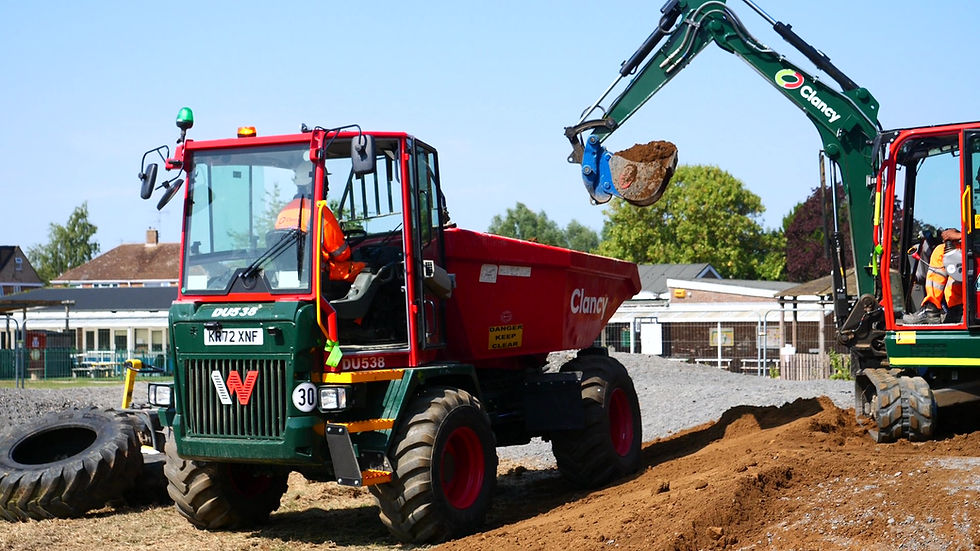Northants school children celebrate first beehives installed on HS2 wildlife site
- EKFB
- Oct 13, 2022
- 3 min read
First two beehives installed on an HS2 wildlife site by the Great British Bee Project
Local school children from Northamptonshire name the queen bee “Lillibee”
Bees from the hives will help protect and expand the endangered British Black Bee right across the UK

The first two of 14 beehives have been installed on a wildlife site created by HS2 in Northants, as part of a unique partnership with the Great British Bee Project (GBBP) to protect and expand populations of the endangered British Black Bee – Britain’s only native bee species - across the UK.
To mark the occasion, school children from The Radstone Primary School visited the site to name the queen bee “Lillibee’. A shortlist of names was chosen and voted on by the school’s Council, which is made up of 12 children aged between seven and 11, who said they put forward the name as a tribute to the late Queen Elizabeth II.
The collaboration was part of the local education and engagement programme run by HS2’s civils contractor EKFB (a team made up of Eiffage, Kier, Ferrovial Construction and BAM Nuttall). Over the last three weeks, the team worked with The Radstone Primary School in Brackley, Northants, to organise an outdoor learning seminar for the children to aid their learning.
The seminar was focused on pollination and the wildlife in their area, and the children had the opportunity to learn more about careers in the fields of ecology and the natural environment.
The HS2 wildlife site is part of HS2’s Green Corridor, which is producing new green spaces for wildlife and the local community along the railway – with over 170 hectares (equivalent to 315 football pitches) already created on the section of HS2 from the Chiltern Tunnel in Buckinghamshire to Long Itchington Wood Tunnel in Warwickshire.
It was selected as an ideal site to help restore Britain’s native bees as it has everything the bees need, including trees, hedgerows, six ponds and well-established wildflower meadows.
James Hicks, Biodiversity Specialist at HS2 said:
“We’re thrilled to be partnering with the Great British Bee Project to help protect and expand populations of the endangered British Black Bee, and it’s fantastic to see the first beehives installed in Northamptonshire. With over 800,000 trees already planted and more than 100 wildlife sites created along the Phase One route between London and the West Midlands, HS2 is perfectly placed to provide a network of high quality habitats where these endangered bee populations can flourish.
“It’s projects like this, including opportunities for schools and local communities to get close to nature, which really bring our Green Corridor programme to life and demonstrate how HS2 is creating a lasting environmental legacy for future generations.”
Martin Kistell, Ecology Manager EKFB said:
“One of the main environmental objectives for HS2 is to support biodiversity in the UK, providing a unique opportunity to create hundreds of new wildlife habitats which will protect species. We can also help to reverse the decline in pollinators, and we’re thrilled to be involved in the Great British Bee Project, which is so vital for the protection and expansion of this threatened species.
“It’s also crucial to educate the next generation, so we’re working with schools and community groups to teach young people about nature and raise awareness of careers opportunities in ecology and nature conservation. It’s been fantastic to work with The Radstone Primary School and it was wonderful to see the children’s faces light up when we showed them the new habitats, the bees and the wildflowers in their own community.”
The GBBP was established in 2018 with the aim of reversing the decline on the British Black Bee. Bees are important pollinators in the UK and vital to the British ecosystem. Over the next 18 months, another 10 hives will be installed across HS2 wildlife sites.
Jeff Castle, Chief Nectar Collector from GBBP said:
“GBBP is pleased to be working with HS2 because we know the project wants to make a genuine difference to biodiversity and to bee conservation. HS2’s new wildlife sites will create ideal habitats for British Black Bees, where they can evolve naturally and add to local biodiversity.
“The bees will be bred until the colonies are ready to split. The pure-bred bees will then be taken to other hotspots around the country, where they will be able to mate with other black bees, bolstering the population across the UK. The more bees introduced to sites like this means more pollinators, more flowers, which in turn leads to more insects, which then attracts more birds and other animals.”
Assistant Head Teacher at Radstone Primary School, Sophie Matthews, said:
“The children thoroughly enjoyed their visit to the conservation site and loved learning about the bees and the environment right on their doorstep. The children have been inspired by their morning and we now have a few budding ecologists on our hands.”





